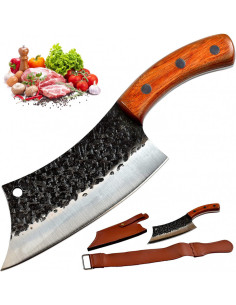Steak knives
The Importance of Meat Knives in the Kitchen
Meat knives are essential tools in any professional or home kitchen. Specifically designed for cutting, filleting, and deboning meat, these knives offer a perfect balance between functionality and precision.
With a good butcher knife, you will improve your skills in the kitchen and be able to prepare more elaborate and attractive dishes. Additionally, a quality knife ensures clean and quick cuts, avoiding fatigue in your hands.
Types of Meat Knives and Their Uses
There are multiple types of meat knives, each designed for a specific purpose. For example, peeling knives are ideal for removing the skin from animals, while cooking knives like the GYUTO are versatile and can be used for cutting all types of ingredients.
The choice of the right knife will depend on your needs in the kitchen, the type of meat you are going to handle, and your level of experience. It is essential to know the characteristics of each knife to achieve optimal results.
Materials and Design of Meat Knives
Meat knives can be made from various materials, including stainless steel, carbon steel, and other alloys. Each material offers different levels of durability and corrosion resistance.
The design of the handle also plays an important role in the user experience. Ergonomic and non-slip handles provide a better grip, increasing comfort and safety when working with them.
Care and Maintenance of Meat Knives
Proper maintenance of the knives is crucial to prolong their lifespan. It is recommended to wash meat knives by hand with warm water and soap, avoiding the use of dishwashers that can damage their blade.
Additionally, regular sharpening is essential. A well-sharpened knife is not only more effective but also safer to use, as it requires less effort to cut.
Tips for Choosing the Right Knife
When choosing a meat knife, consider the weight and size of the blade. A heavier knife may provide more strength and control in cuts, while a lighter one may be more manageable for more delicate tasks.
It is also important to try the knife before purchasing it. Holding the handle and making some simulated cuts will give you a better idea of how it feels and whether it fits your cooking style.
Benefits of Using Quality Knives in the Kitchen
Using high-quality knives not only enhances the culinary experience but also ensures more professional results. Precise cuts and less effort during preparation are just some of the benefits.
Incorporating quality meat knives into your kitchen utensils will result in more satisfying and appreciated dishes, elevating your level of cooking and delighting your family and friends.
What knife is best for deboning?
The peeling knife is the most recommended for deboning, as its design allows for precise and controlled cutting around the bones.
Are stainless steel knives better?Yes, stainless steel knives are resistant to corrosion and require less maintenance, making them a durable option for the kitchen.
Is it necessary to sharpen knives before using them?Yes, it is recommended to sharpen knives before each use to ensure clean cuts and avoid injuries.
How long do quality knives last?With proper care and maintenance, quality knives can last many years, even a lifetime.
What is the difference between a GYUTO knife and a SANTOKU?The GYUTO knife is of Japanese origin and is primarily used for meat and fish, while the SANTOKU is more versatile and suitable for all types of ingredients, including vegetables.
Can I use a butcher knife for other foods?Yes, but it is more advisable to use a specific knife for each type of food to maintain flavors and the integrity of the ingredients.
Where should I store my knives?Ideally, store them in a knife block or in a sheath designed to maintain the blade and protect the knife from damage.
Explore our wide selection of meat knives and elevate your culinary experience. Find the perfect knife that suits your needs and enjoy precise and effortless cuts in your kitchen. Your next gourmet creation starts here!


































































